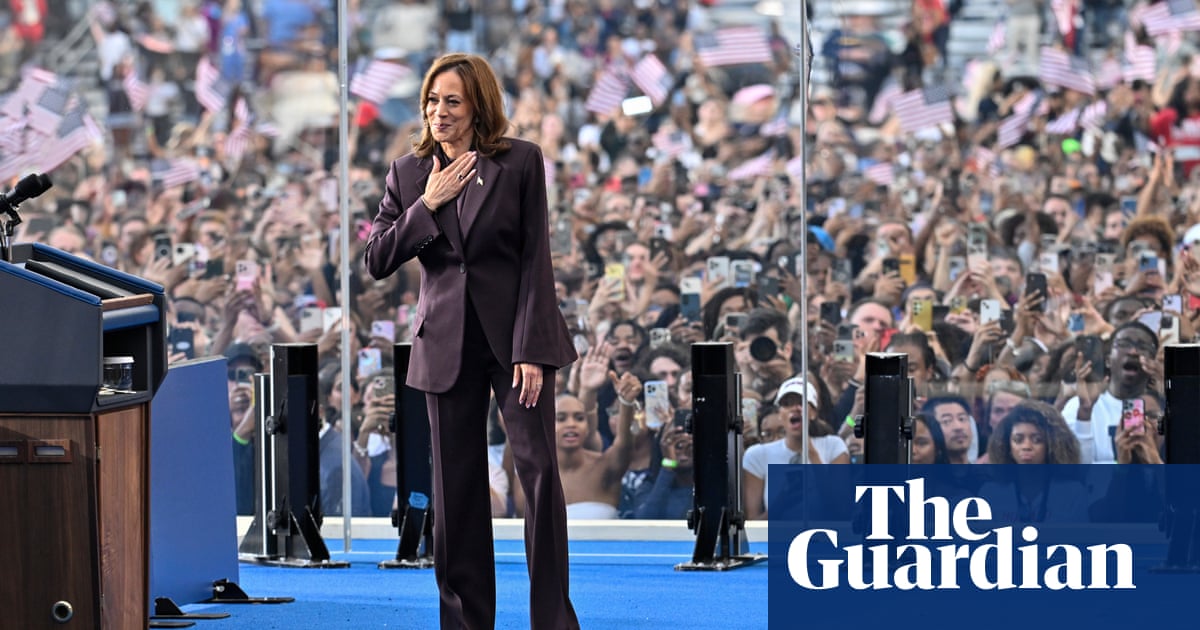Ukraine’s energy company says emergency power blackouts have ended
Suspilne, Ukraineâs state broadcaster, reports that emergency power blackouts in the country have ended.
This does not mean that everybody will remain with power for the rest of the day. Ukrenergo announced that âall customers return to hourly outage schedulesâ.
Key events
Putin threatens to target ‘decision-making centres in Kyiv’ with new Oreshnik IRBM missile
President Vladimir Putin has boasted that Russia produces ten times more missiles than all of the Nato countries combined, and threatened an attack on decision-making centres in Kyiv with its new intermediate-range ballistic missile (IRBM) missile.
Appearing at the Collective Security Treaty Organisation (CSTO) summit in Astana, Putin spoke about the capabilities of the Oreshnik missile.
He said that Russia had been forced to deploy the new missile âin response to the enemyâs actionsâ â a reference to the use of US and UK manufactured missiles inside Russian territory â and that there were âno analogues to the Russian Oreshnik in the worldâ. He said western equivalents would not appear any time soon.
In the event of a massive use of the Oreshnik, the force of the strike will be comparable to a nuclear weapon, he said.
He said decision-making centres in Kyiv could become a target for the Oreshnik missile, and pointed out that Ukraine has launched multiple attacks against Moscow and St Petersburg. Ukraine carried out its biggest drone strike on Moscow earlier this month.
US and UK sources indicated to the Guardian last week that they believed the Oreshnik missile fired on Dnipro was an experimental nuclear-capable, intermediate-range ballistic missile (IRBM), which has a theoretical range of below 3,420 miles (5,500km). That is enough to reach Europe from where it was fired in south-western Russia, but not the US.
Tass reports that in Kazakhstan, Putin also said that other new missile systems could appear and that Russia will continue combat tests of the Oreshnik.
Ukraine’s energy company says emergency power blackouts have ended
Suspilne, Ukraineâs state broadcaster, reports that emergency power blackouts in the country have ended.
This does not mean that everybody will remain with power for the rest of the day. Ukrenergo announced that âall customers return to hourly outage schedulesâ.
Tass reports that Russia claims it shot down one of Ukraineâs Neptune guided missiles overnight.
Ukraineâs air force has claimed it shot down 79 out of 91 missiles fired by Russian, and downed 35 out of 97 drones, Reuters reports.
Zelenskyy claims use of ‘cluster munitions’ is a ‘vile escalation of Russian terrorist tactics’
Volodymyr Zelenskyy has claimed that Russia used cluster munitions in a massive strike at Ukraineâs energy infrastructure overnight, describing it as âa very vile escalation of Russian terrorist tactics.â
Ukraineâs president, in a message posted to Telegram, said that about 100 drones and 90 missiles were involved in the attack, adding:
In several regions, Kalibr strikes with cluster munitions were recorded, specifically on civilian infrastructure. These cluster parts make it much more difficult for our rescuers and energy workers to eliminate the consequences of the impact, and this is a very vile escalation of Russian terrorist tactics.
Earlier authorities in Ukraine reported that at least one million people were without power. Missile debris was reported at two locations in Kyiv, but local authorities claimed that air defences intercepted all of the missiles fired at the capital. Many other regions reported strikes.
Zelenskyy reiterated Ukraineâs appeal for better air defences in his message, saying:
Each such attack proves that air defence systems are needed now in Ukraine, where they save lives, and not in storage bases. This is especially important in the winter, when we have to protect our infrastructure from targeted Russian strikes. We are constantly working with partners to have more power to defend and timely delivery now and full implementation of agreements particularly on air defense is what is most needed.
Ukraine disconnected several nuclear power units from the network amid Russian attacks on energy infrastructure on Thursday, a Ukrainian energy industry source told Reuters.
This map from our interactive team shows the location of Ukraineâs three operational nuclear power plants, along with the Zaporizhzhia plant, which has been occupied by Russian forces since nearly the very beginning of the invasion, and the location of Chernobyl, site of the accident in 1986.
Reuters reports that a source in Ukraineâs energy industry told it that overnight Russia struck infrastructure with âa hard blowâ, and claimed cluster munitions were deployed. The claims have not been independently verified.
In Russia, Tass reports that authorities in Kursk have opened a criminal case against Ukrainian service personnel after two civilians were injured in a drone attack on vehicles on Wednesday.
âDuring the preliminary investigation, all representatives of the armed formations of Ukraine involved in this crime will be identified and brought to justice as provided by law,â the main military investigation department said.
Ukraine launched in incursion into Kursk in August.
One million people reported without power in Ukraine after Russian attacks on energy infrastructure
At least one million people are without power across Ukraine after a large Russian overnight missile attack on energy infrastructure in the country.
Reuters reports that three regions in the west are affected by the power outages. Maksym Kozytskyi, governor of Ukraineâs western region, reported energy infrastructure attacks there, and said more than half a million people in the region were without power. Missiles were detected overnight headed for Kharkiv, Odesa and eight other regions
Missile debris was reported at two locations in Kyiv, but local authorities claimed that air defences intercepted all of the missiles fired at the capital. Mayor Vitali Klitschko reported damage to property but no casualties.
The national power grid operator Ukrenergo had âurgently introduced emergency power cutsâ, said the energy minister, German Galushchenko. The temperature in Kyiv was not expected to rise above 2C (35.6F) today.
Russiaâs ministry of defence claimed to have destroyed 25 Ukrainian drones overnight in four regions, including the Moscow-annexed Crimea, which Russia seized in 2014.
Reuters has a quick snap that there are power cuts in Ukraineâs southern region of Mykolaiv as a result of Russiaâs missile attack. It cited regional governor Vitaliy Kim.
Zhitomir and Chernihiv region have ended their air alarms in Ukraine.
Maksym Kozytskyi, governor of Ukraineâs western Lviv region, reports on the Telegram app that energy infrastructure in the region has been attacked by Russia
Mayor of Kyiv, Vitali Klitschko, has posted to Telegram to report that debris from a rocket has hit a private business in Darnytskyi district in south-east of the city. He reported there were no casualties, but that damage was caused.
Russia claims to have destroyed 25 Ukrainian drones overnight
Russiaâs air defence systems destroyed 25 Ukrainian drones overnight over four regions, the defence ministry said on Thursday, Reuters reports.
Fourteen of the drones were destroyed over the Krasnodar region, six over the Bryansk region, three over Moscow-annexed Crimea and two over the Rostov region, it said.
Krasnodarâs regional governor, Veniamin Kondratyev, wrote on Telegram that two districts in the southern Russian region were subjected to a âmassive drone attackâ overnight. One civilian was injured, he said.
A senior UN official, Rosemary DiCarlo, this month denounced the rise in civilian casualties in the nearly three-year conflict between Ukraine and Russia, noting Moscowâs targeting of Ukraineâs energy infrastructure may make this winter the âharshest since the start of the warâ.
The latest missile salvo from Russia comes a day after US president-elect Donald Trump named staunch loyalist and retired general Keith Kellogg as his Ukraine envoy, charged with ending the Russian invasion.
Ukraineâs energy grid has been heavily targeted since Russia invaded in February 2022, with Kyiv accusing Moscow of âterrorâ tactics by trying to plunge Ukrainian cities into darkness and cut off heating to civilians throughout the winter, writes AFP.
The overnight strikes come after two weeks of dramatic escalation that has seen both sides launch new weapons to gain an upper hand ahead of Donald Trump being inaugurated as US president in January.
Russia earlier this week said it was preparing its own retaliation for Ukrainian strikes on its territory using US-supplied Atacms missiles.
Ukraine has launched at least three attacks on Russian border regions with the missiles since the White House gave it permission to fire them on Russian territory.
Moscow responded to the first strike by firing a never-before-seen hypersonic ballistic missile at the Ukrainian city of Dnipro.
In an angry address to the nation, Russian president Vladimir Putin warned the nuclear-capable missile could be used against western countries if they let their arms be used by Ukraine to hit Russia.
Ukraineâs military said earlier Thursday that an air raid alert had been declared across the country âdue to a missile threatâ in a message on Telegram.
Missiles were detected headed for Kharkiv, Odesa and eight other regions, according to other messages from the air force. âKharkiv, go to the shelters!â it warned.
Oleg Synegubov, head of the Kharkiv region military administration, said on Telegram that three strikes had hit Kharkivâs Kyivskyi district, with no casualties reported so far.
The mayor of Lutsk in northwestern Ukraine, Igor Polishchuk, said that âexplosions were heard againâ in the city.
Ukraine power grid under ‘massive’ enemy attack, energy minister says
Explosions were heard in the Ukrainian cities of Odesa, Kropyvnytskyi, Kharkiv, Rivne and Lutsk on Thursday morning amid reports of a Russian cruise missile attack, Ukrainian news outlets Zerkalo Tyzhnya and Suspilne said.
âEnergy infrastructure is once again targeted by the enemyâs massive strike,â said the Ukrainian energy minister, German Galushchenko.
The Kharkiv mayor, Ihor Terekhov, said: âThe enemy continues to attack Kharkiv with missiles.
The Odesa regional governor, Oleh Kiper, urged residents to stay in shelter.
The Kyiv mayor, Vitali Klitschko, said air defence was at work.
The national power grid operator Ukrenergo had âurgently introduced emergency power cutsâ, said the energy minister, German Galushchenko, as temperatures across the country dropped to around freezing.
One energy supplier, DTEK, said Ukrenergo was introducing emergency power outages in the regions of Kyiv, Odesa, Dnipro and Donetsk.
Opening summary
Hello, this is the Guardianâs live coverage of Russiaâs war against Ukraine. This Thursday morning, Ukraine has come under widespread air raids, with a national alert issued and officials saying the countryâs energy infrastructure is once again the Kremlinâs target.
More of that to come, but for now, hereâs a summary from our Ukraine war briefing of other major developments:
-
A senior official in Joe Bidenâs administration has told the Associated Press that the US is urging Ukraine to quickly increase the size of its military by drafting more troops and lowering the conscription age to as young as 18 to help expand the pool of fighting age men available.
-
The Biden administration is preparing another urgent weapons package for Ukraine, this time worth $725m, two US officials said on Wednesday. It is predicted to include landmines, drones, Stinger anti-air missiles, and Himars ammunition, including GMLRS rockets with cluster warheads. The formal notification to Congress of the weapons package could come as soon as Monday, one official said.
-
Ukrainian forces made a âcomplex drone and missile strikeâ against Sevastopol in occupied Crimea on Wednesday, targeting the Belbek military airfield and a naval school, according to Russian and Crimean sources cited by the Institute for the Study of War. The attack reportedly used Ukraineâs homegrown Neptune cruise missiles, Soviet-style S200 missiles, western-provided Storm Shadow missiles, 40 strike drones and unspecified ballistic missiles. The US-based thinktank suggested it bolstered the case for the âprovision of long-range strike weapons to Ukrainian forcesâ.
-
Volodymyr Zelenskyy is due on Thursday to sign Ukraineâs 2025 budget, which calls for the countryâs first wartime tax increases. The finance minister, Serhiy Marchenko, said Ukraine hoped tax increases would generate additional budget revenues of 141bn hryvnia (US$3.39bn). The prime minister, Denys Shmyhal, said record sums would be directed to weapons production and purchases including modernising Ukraineâs defence industry and buying drones.
-
There was no word on whether South Korea will supply arms to Ukraine after Kyivâs defence minister, Rustem Umerov, met with the South Korean president, Yoon Suk Yeol, in Seoul on Wednesday. Yoonâs office said the two sides agreed to continue to share information on North Korean troops in Russia and North Korean-Russian weapons and technology transfers, while closely coordinating with the US. Umerov briefed other South Korean officials on the status of the Russia-Ukraine war and expressed hope that Kyiv and Seoul would strengthen cooperation, the statement said. Umerov predicted a âtangible strengthening of security for our peoples and regionsâ.
-
Russiaâs rouble has plunged to its lowest rate against the dollar since the early weeks of the full-scale invasion of Ukraine in the wake of new western sanctions and growing geopolitical tensions, Pjotr Sauer writes.
-
Donald Trump has picked Keith Kellogg to serve as special envoy for Ukraine and Russia â a newly conceived role given the ongoing war, Gloria Oladipo writes. Kellogg served as a national security adviser to the former vice-president Mike Pence, then acting security adviser to Trump himself after Michael Flynn had to resign. Kellogg has said he would emphasise getting the two countries to the negotiating table.
-
Russiaâs sabotage of western targets may prompt Nato to consider invoking its article 5 mutual defence clause, Bruno Kahl, head of Germanyâs foreign intelligence service, has warned. The BND chief, speaking in Berlin on Wednesday, said he expected Moscow to further step up its hybrid warfare.
-
Nordic and Baltic states and Poland said on Wednesday that they would in the coming months step up support for Ukraine, including to its defence industry, and invest in making more ammunition available. âWe are committed to strengthening our deterrence, and defence, including resilience, against conventional as well as hybrid attacks, and to expanding sanctions against Russia as well as against those who enable Russiaâs aggression,â the leaders of Denmark, Estonia, Finland, Latvia, Norway, Poland and Sweden said in a statement.
-
The head of the EU executive, Ursula von der Leyen, called for more defence spending in Europe over the next five years, as her top team was voted in by a wafer-thin majority in the European parliament. The EU faces acute challenges, including the war in Ukraine, the return of Donald Trump and the climate crisis, all against a backdrop of deepening fears of economic decline as von der Leyen starts her second term.
-
Poland said on Wednesday that it had detained a German citizen and charged the suspect with brokering and exporting dual-use goods to Russia. The German citizen traded in specialist machines used in the technological industry, which â through his company â were illegally sent to Russian military plants involved in the production of weapons, said the Internal Security Agency (Isa). âThe suspect pleaded guilty and filed a motion for voluntary submission to punishment.â
-
Vladimir Putin arrived in Kazakhstan on Wednesday. Kazakhstan is a member of the Moscow-led CSTO security alliance but has expressed concern about the Ukraine war, which the Kazakh president, Kassym-Jomart Tokayev, has refused to condone. Kazakhstan is also working to detour away from Russia as a route for its oil export, using Turkey instead.









